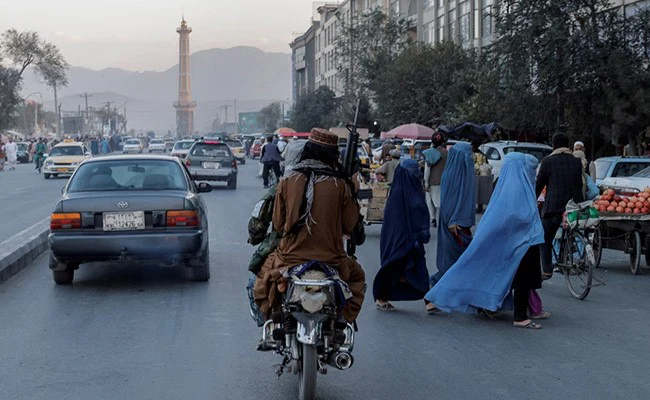One of the hotspots of the seemingly unending conflicts, the borderlands of Afghanistan and Pakistan have become a significant link in the global chain of narcotics production. Add to this cauldron a potent mix of terrorism, extremism and radicalism, and we have a nexus of activities and events that pose a threat to both countries, and to the rest of the world.
India, because of its geographical proximity to the infamous “golden crescent” – the region comprising Iran, Pakistan and Afghanistan that is the world’s largest producer of illicit opium – often finds itself reeling under the impact of narco-terrorism.
A combination of narcotics trafficking and terrorism/extremism, narco-terrorism has become a source of persistent social and legal trouble, particularly in Afghanistan and the areas near its border with Pakistan. The Taliban’s takeover of Afghanistan in August last year is only expected to make matters worse.
The former insurgent group banned poppy cultivation in April this year. However, it had outlawed the cultivation of poppy in the past for being anti-Islamic, and the policy did not hold ground for long. In fact, the illicit opium trade has been a major source of income for the group.
With the continuing international freeze on Afghanistan’s economic assets and the meagre financial support the country is receiving from its erstwhile donors, there is likely to be an uptick in the production and sale of illegal drugs. In the absence of significant international monetary support, it will not be surprising if an increasing number of Afghan farmers turn to poppy cultivation as an income source.
The gross income generated by domestic consumption, production and export of opiates in Afghanistan was estimated at between US$1.8 billion and US$2.7 billion in 2021, equivalent to between 9 and 14 per cent of gross domestic product.
The Taliban, which is now in charge of Afghanistan’s political and economic institutions, is expected to further increase the cultivation of poppies in the drought-ridden country to keep itself in power.
The rising instability in Afghanistan and schisms within the Taliban may provide greater impetus for the production of and trade in drugs. Frictions over control and styles of governance could make leaders of factions within the group turn to poppy cultivation to finance their own agenda.
A Taliban push for the opium trade on the whole, combined with its support to terrorist organisations like al-Qaeda, could exacerbate the challenge of narco-terrorism.
Exhibiting a symbiotic relationship wherein the illicit drug trade sponsors terrorism and vice versa, narco-terrorism is hardly a new phenomenon. However, the Soviet Union’s invasion of Afghanistan in 1979 and the subsequent wars that have been fought in and around Afghanistan have increased the chances of drug trafficking and terrorism coming together.
Today, narco-terrorism circuits transcend regional boundaries; the drugs produced and refined in the golden crescent are known to have bolstered conflict and organised crime in countries beyond South Asia.
According to Narco-Insecurity Inc, a recent Nato publication, the opium channelled through the drug pipeline originating in Afghanistan reaches 84 per cent of the world. Under the Taliban, the trade in opium of Afghan origin made its way into Central Asian states as well as countries in the Balkans and the Caucasus.
Narco-terrorism is both a cause and effect of political, social and economic insecurity, which creates a conducive environment for various non-state actors to use drug trafficking and extremism to attain their objectives. It is no surprise that states that are either classified as failed or are considered to be failing at delivering basic goods and services to their citizens often become hubs for the illegal drugs trade and the perpetuation of violent extremism.
In areas marred by a general level of insecurity, such as the borderlands of Afghanistan and Pakistan, the line between drug trafficking organisations and groups that promote religious extremism is often blurred.
Abetted in the past by systems such as hawala – a trust-based money transfer network spread across the Middle East, parts of Africa and the Indian sub-continent – narco-terrorism is now aided by developments in financial technology. Blockchain technology and cryptocurrencies, for example, are enabling both drug trafficking organisations and terrorist organisations to evade detection of their transactions.
However, these non-state actors often work in cahoots with other segments of society, including corrupt state officials, farmers and labourers, warlords and the like, which make the drug-terrorism nexus difficult to dismantle. In other words, it is not just the drug-trafficking organisations or terrorist entities that are responsible for the perpetuation of narco-terrorism, but also the larger context, where political insecurity, economic instability and other geopolitical and domestic factors come together.
With the US withdrawal from Afghanistan and the subsequent takeover by the Taliban last year, the halting of international financial support, and an evident decline in global interest in the conflict-ridden country, the shape of narco-terrorism will undoubtedly evolve. Narco-terrorism may have already witnessed a massive operational shift, moving away from older transaction methods to those based on fintech.
Similarly, the gap created by the lack of an on-the-ground intelligence network in Afghanistan will have an impact on international operations against drug trafficking and terrorism, requiring the global community to devise newer and more effective monitoring and other techniques to counter the ills of narco-terrorism.

